Meat News
The FSA’s year-long survey, which tested around 4,000 samples of whole chickens bought from UK retail outlets and smaller independent stores and butchers over the past 12 months, found the presence of campylobacter in 73% of chickens tested. One-fifth (19%) of chickens tested positive for campylobacter with the highest band of contamination (more than 1,000 colony forming units per gram (>1,000 cfu/g)).
Just 0.1% (five samples) of packaging tested positive at the highest band of contamination with 7% of packaging testing positive for the presence of campylobacter.
All of the major retailers failed to reach industry targets to reduce the bug over the period of the study. Tesco was found to have the lowest numbers of campylobacter, with just 12.8% of its chickens found to have the highest band of contamination while 66.5% of its chickens had presence of campylobacter.
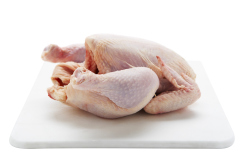
Marks & Spencer, Morrisons, Sainsbury’s and Tesco all had below-average levels of campylobacter found, while 80% of Asda chickens tested positive for its presence. Just under one-third (29.7%) of Asda chickens tested positive for the highest band of contamination.
Steve Wearne, FSA director of policy, praised the retailers that had reduced incidents of campylobacter but called for more action: “I am absolutely delighted to see the really encouraging results from these four supermarkets and their suppliers. They are making a real difference to public health, helping to cut down on the estimated 280,000 people who get ill from campylobacter each year.
“As we have always said, if you are prepared to work across the food chain to reduce the spread of this bug then you will get results.
“I want to challenge those retailers who haven’t yet demonstrated the effect that M&S, Morrisons, The Co-op and Waitrose are having on reducing campylobacter on chickens on their shelves. We expect all retailers and processors to be achieving the reductions we have seen in these retailers’ figures – that’s the only way we will meet the target we all signed up to.
“We are going to run this survey for a second year and will again look at campylobacter levels on chickens at retail sale. I hope that we will be able to see the results from the actions taken by the four retailers mentioned above and others come through and produce much lower figures for the incidence of campylobacter on the chicken we buy.”
Richard MacDonald, chair of the ACT (Acting on Campylobacter Together) board, added: “I have been impressed by the level of commitment and tangible action being taken by a number of retailers and processors of chicken. I hope we continue to see further progress in our fight to significantly reduce or even eradicate campylobacter on chickens. Individual actions and cross-industry sharing of best practice are starting to have a real and tangible impact.”
Commenting on the results, a British Poultry Council spokesperson said: “As highlighted by the FSA, individual producers and their retail customers are working bilaterally to trial options including enhanced biosecurity, management of thinning, improved processing, temperature treatments, and novel packaging. It is worth reiterating that campylobacter is killed by thorough cooking, and cross-contamination can easily be avoided by good kitchen hygiene practices.
“The BPC is committed to ensuring that when practical and effective solutions for beating campylobacter are developed, they will be made available to all producers.”
A new survey will start this summer and once again sample fresh whole chickens from all types of shops
Official figures released by the government for show UK pig slaughterings have continued to rise.
Monthly numbers were 3.4% higher for April 2015 than in April 2014 at 969,000 head. Year-on-year pigmeat production was 82,000 tonnes (t), 4.4% higher than in April 2014. Throughputs have now been up year on year for 12 consecutive months, with nearly 300,000 extra pigs processed during that period.

Once again there is little indication that the drop in pig prices is leading to producers reducing or liquidating their herds. Slaughterings in Northern Ireland were up by 4%, slightly more than in England, but figures for Scotland are not yet available. Carcase weights during the month were at their lightest since August, averaging 81.6kg, according to Defra.
Meanwhile, UK prime cattle slaughterings in February 2015 were 2.6% lower than in April 2014 at 184,000 head. Beef and veal production was 81,000t, 2.2% lower than in April 2014.
UK clean sheep slaughterings were 4.2% lower than in April 2014 at 1,058,000 head. This is the first month there has been a drop in throughput year on year since March 2014. Mutton and lamb production was 25,000t, 6.1% lower than in April 2014.
Gloucester Services has opened a new southbound site, enabling commuters to get their meat while filling up their car.
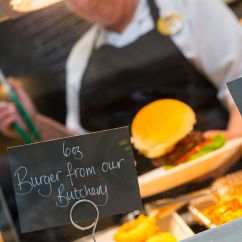 Located between junctions 12 and 11A of the M5, the new southbound services is run by the Westmorland Family, and has a farm shop that sells products from over 130 local suppliers (within 30 miles) and 70 regional suppliers (30-50 mile radius). There is also a traditional butcher’s counter, which only stocks meat from the county.
Located between junctions 12 and 11A of the M5, the new southbound services is run by the Westmorland Family, and has a farm shop that sells products from over 130 local suppliers (within 30 miles) and 70 regional suppliers (30-50 mile radius). There is also a traditional butcher’s counter, which only stocks meat from the county.
Sarah Dunning, CEO of the Westmorland Family, said: “Local food and local producers are at the heart of our offering, alongside quality local staff – it’s what makes our business special, it sets us apart.
“We pride ourselves on having an old-fashioned butcher’s, hanging the meat on the bone for up to three weeks and offering traditional cuts of meat – from sirloin on the bone and t-bone steaks, cut just as you like them, to seasonal specialities such as sweetbreads.”
Its northbound services has been open since May 2014, with more than 500,000 locally sourced meals and 33,000 Cinderhill sausage rolls sold in the past 12 months.
Dunning said the combination of a motorway services and locally-sourced food will help drive awareness of what the area has to offer. She said: “Bringing the concept of local food to the motorway is wonderfully democratic. Suppliers are given a shop window and accessible markets, motorists enjoy great local food, and we’re preserving regional foods and identity. It’s a game where everyone wins. Good-quality locally produced food shouldn’t be the sole preserve of high-end shops, it should be affordable and available to everyone. That’s why we serve it on the motorway.”
The Great British Tri-Nations Butchers Challenge team are getting ready for this year’s contest.

In preparation for the event, which takes place in New Zealand this September, the six-man team has been taking part in intense practice sessions at Leeds City College and at the Scottish Craft Butchers Awards in Perth, Scotland.
These practice sessions have focused on honing the team’s practical and innovative skills by utilizing an entire lamb and a half side of beef to create a range of products. At the actual event, the team will have to do this, but with a two-hour time limit and in front of a large audience.
David Lishman, Great Britain captain, said the team was keen to be at its best for the upcoming Challenge. “This year’s British team has massive enthusiasm and top-rate butchery skills. Our practice sessions have demonstrated just what a talented group we have, and boosted our confidence to push the Kiwis and Aussies hard for the title.
“Our focus so far has been on developing a theme and the various cuts to highlight exactly what we can do. With a side of beef, side of pork and a full lamb carcass, there is a considerable amount of meat to use and display. Small goods and sausage products are also an important element to the competition, enabling us to showcase the wealth of great expertise in the group.”
The meat industry is at risk of a serious skills shortage, according to the managing director of catering butcher Yorkshire Dales Meat Company, who is calling on the new government to implement a clear strategy when it comes to apprenticeships.
James Knox said he was concerned that there was not enough awareness among young people about apprenticeships, making it tougher for meat companies to recruit the next generation of employees.

According to Knox, there is a general unease across the butchery industry that not enough young people are being attracted into the sector.
Knox said: “I don’t want to be seen to be critical, but I do feel that there was a lack of real, focused and consistent strategy in terms of apprenticeships during the coalition, especially in regards to traditional industries like ours.”
He said Yorkshire Dales employed plenty of skilled butchers in their 30’s or 40’s, but that it lacked that next generation of young, local butchers.
“Part of the problem is that we don’t think people are being told about butchery or other food industry skills as potential career paths or apprenticeships.
“As such, we would encourage the newly elected government to create better strategy and communication around apprenticeships – especially at a local level – to help safeguard the future of industries like ours.”
According to the new Conservative manifesto, the coalition government created 2.2million apprenticeships over the past five years, and the new government said it wanted to create a further three million over the next five years – including trebling the number of food, farming and agri-tech apprenticeships.
The Royal Welsh Agricultural Society (RWAS) Spring Festival in Builth Wells next weekend will host a series of short seminars with the heading ‘Profiting from Pigs’.
The new website will go live in the summer and will include an introduction to Welsh pork production, a directory of pig producers and case studies.
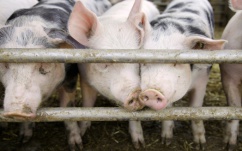
“This new website will form part of our plans to increase awareness of pork suppliers in Wales and the quality of their products,” said Melanie Hughes, HCC’s market development officer. “It will offer producers an opportunity to build their online presence and will be a starting point for customers who are looking to source locally produced pork.
“During the Spring Festival, we will be introducing the website to the industry and recruiting interested producers for the directory.”
Other HCC activities during the weekend will include a programme of seminars, delivered in partnership with Farming Connect and the RWAS. Also held in the pig shed, these sessions will be suitable for large and small-scale producers and will cover topics including pig health, artificial insemination and adding value through direct sales.
Luned Evans, HCC’s industry development officer, said: “The seminars are free to attend and will be an interesting source of information for anyone keen to learn about rearing pigs. Speakers with specialist knowledge of the sector have been invited and will be happy to share their expert advice.”
The Spring Festival will take place on 16 and 17 May at the Royal Welsh Showground.
Sales of fresh meat and poultry have dropped in both value and volume over the 12 weeks to 26 April 2015.
According to the Kantar Worldpanel’s Meat, Fish & Poultry Market Update, fresh primary meat and poultry value sales dropped by 4.3% compared to the same period in 2014, while volume sales fell by 1.1%.
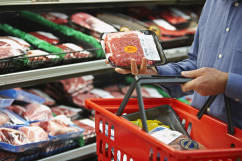
Turkey was the worst-affected, seeing a 13.5% drop in volume sales and a 7.3% drop in value sales, followed by pork which saw a 12.1% in value and a 7% drop in volume.
Value sales of chicken fell by 4.2% but grew 0.3% in volume.
Lamb saw a surge in volume sales in the period due to Easter, increasing by 3.6%. However, promotional activity meant that value sales fell by 2.4% year-on-year.
On the processed side, the good weather in spring helped boost volume sales of burgers and grills by 13.3%, with value sales rising by 15.3%, which in turn grew the overall fresh processed meat and poultry sector sales by 1.6% in value and 3.1% in terms of volume.
An increase in price cut promotions in processed poultry has also led to “significant growth” of 7% value sales and 8.6% volume sales.
Pat O’Doherty, of O’Doherty’s Fine Meats, from Enniskillen, Co Fermanagh, has developed a pork pie with truffles and mushrooms, and a pork pie with a herb pastry base, to coincide with the Oscar Wilde Festival, which will take place in the same town.

Wilde attended Portora Royal School in Enniskillen before studying at Trinity College in Dublin and Oxford University.
O’Doherty said: “The pig has long been the most important animal in rural communities like Fermanagh and it made sense to create new pork pie flavours to give visitors to Enniskillen an opportunity to enjoy pies with a difference as part of the tourism experience. Pigs were the mainstay of family farms for generations throughout Fermanagh.
“Oscar Wilde would certainly have enjoyed pork in pies and other dishes during his seven years at Portora Royal School. The pies can be eaten hot or cold and provide a tasty treat for visitors to Enniskillen.
”O’Doherty’s Fine Meats is a family-run business, which has provided meat to Enniskillen since the 1940s, and is the pioneer of the award-winning Fermanagh Black Bacon.
Invest Northern Ireland said the launch of the new pies was a further sign of the convergence under way in Northern Ireland between tourism and local food, with O’Doherty also behind the country’s only Black Pudding festival.
A new project that aims for genetic improvement in the sheep industry is looking for rams for artificial insemination (AI).
The team behind the RamCompare project is looking for eight rams for the AI section of the project: two Texel, two Charolais, two Suffolk, one Meatlinc and one Hampshire Down.
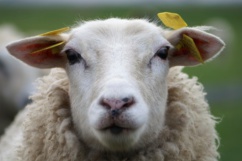
The RamCompare project was announced earlier this year, with the aim of driving genetic improvement forward through the inclusion of commercial data in genetic evaluations.
Eblex explained that many of the potential AI rams have been identified, and semen that has already been collected from widely used sires is being used where possible. However, some rams are being sent for semen collection.
Samuel Boon, Eblex breeding services manager, said: “This is an exciting phase of the RamCompare project, as we seek to find the rams that will start off the initiative.
“We have been in touch with all registered performance recorded breeders and are confident that the project will move forward with some of the best rams available involved.
”The next stage will be to purchase 24 rams for use by natural mating within the single-sire mating groups in the first year of the trial.